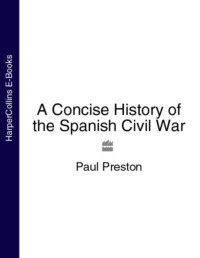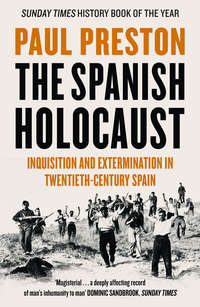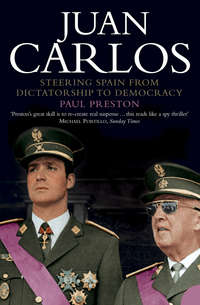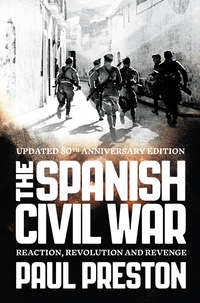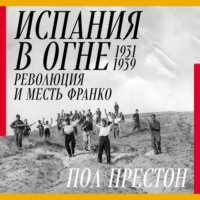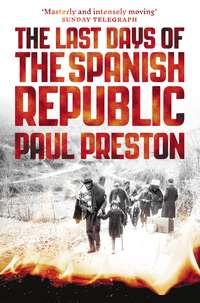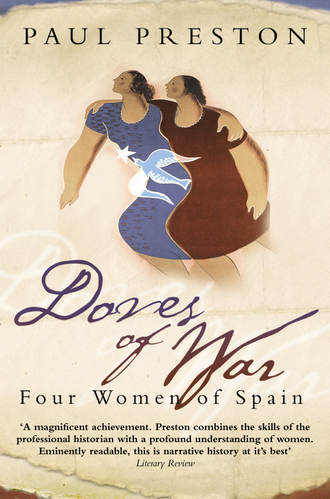
Полная версия
Doves of War: Four Women of Spain
The extent to which Pip had changed was illustrated on one of her frequent journeys. She had always been intrepid and was not fazed by hair-raising trips alone across mountain tracks in thick fog or through floods. The war had hardened her. On 16 February, she had an accident. Driving into Barcelona, intent on manoeuvring her car through convoys of lorries on narrow roads, she did not notice an old lady wandering into her path and could not brake in time. The woman was scared and bruised but otherwise unharmed. At one level, Pip was horrified but quickly recovered, commenting later, ‘I have gained an instantaneous cold-bloodedness in this war from having to show no feelings in my work when my insides are writhing. And ever since I was shelled at Escatrón I have a complete cold control over myself which is very useful.’114
Pip got her mother to send out 500 bedcovers, lots of white material, cloaks, boots together with some peach brandy and 10,000 cigarettes. She drove for twenty hours to Sanlúcar to spend her leave with Ataúlfo. She finally began to recover from the ravages of the war.
I live in a sort of peaceful haze of pleasure. The continual trouble of having to watch my step with Ataúlfo so as never to appear more than good friends when I really long to be close to him, to touch him and so on is amusing despite its unpleasantness and frustration. It is like a continual game. I let myself go as close to flirting as I dare but without ever going a step too far, not even by so much as a look. I don’t know how long I shall have the self-control and placidity to be able to go on like this but for the moment it hardly disturbs my happiness at all, rather adds a flavour to it if anything. Neither the past nor the future exist and I live gloriously in the present here with Ataúlfo.
They spent idyllic hours gardening in El Botánico. The only cloud on the horizon was the amount that she was drinking – ‘a disgrace. I even take brandy to finish off my breakfast.’ It was an indication of the toll taken on her by the war. On Saturday, 25 February, she spent the night in Seville and got riotously drunk and danced with Ataúlfo in a nightclub until dawn. ‘It was a heavenly evening, nobody existed in the world as far as we were concerned.’ They paid the price the following morning when they set out for the long drive to Épila with the corresponding hangovers. They arrived just as the radio was announcing that Britain and France had recognised Franco. The end of the war was imminent. This elated her immensely but the shadow of a general war soon dampened spirits. It was a reflection of the Germanophile and anti-Semitic ambience of Prince Ali’s household that she could write in her diary: ‘The news from England tonight was once more all about war preparations in view of the imminent crisis. There is no crisis but as the Jews have sworn to have a European war this spring come what may, I suppose there soon will be.’115
With the war effectively over, there was little for Pip to do. Inevitably, away from the chaos of the front, her mind focused on Ataúlfo and she saw him frequently. Her pleasure in this was negated by signs that Princess Bea was starting to worry about their relationship. ‘Somehow a strange feeling seems to have crept into the atmosphere. It is impossible to explain and may be all my imagination but there have been so many tiny probings and pointed remarks and meaning looks.’116 There are various reasons why this might have been the case. If Ataúlfo was getting attached to her, that would challenge Prince Ali’s hopes for his son to marry a royal. It is more likely that Princess Bea knew instinctively that her son had no real interest in women, would never marry and perhaps wanted to avoid Pip being hurt. All this was going on while the Republican zone was disintegrating into a mini civil war between the Government and the anti-Communist forces of Colonel Casado. Her unit had been sent to Don Benito in the province of Badajoz – at the best of times, a drab town. Now, pockmarked by shells and bombs, it was without any charm. To make matters worse, she was worried that she would miss the triumphal Nationalist entry into Madrid. In the event, her time there was made pleasant by sunbathing and horse riding. It was also just about near enough for visits to the Orléanses who were now in Talavera de la Reina. Her peace of mind was briefly disturbed by news of the Germans marching into Slovakia in mid-March.117
On 22 March 1939, her unit moved to Pueblonuevo in Córdoba – ‘a filthy little dump’. She was depressed. ‘God I wish this war would stop. I am fed up to the back teeth and will go raving mad soon.’ The Nationalists were preparing for the final march on Madrid. Conditions in Pip’s new hospital were primitive. ‘It is hell having to start this war again when we all thought it was over and finished. I am sick of it and never want to work again in my life. My worst worry is my terror of there being a European war although things are temporarily quieting down.’ Pip dreaded moving from one bleak village to another although in fact the end was nigh. She was released from her unit and, after a difficult search through the frozen sierras near Ávila, she managed to rejoin Princess Bea. The Infanta was about to enter Madrid with Frentes y Hospitales and Pip became one of her staff preparing food and blankets to take into the starving city that had been besieged for two and a half years.118
On 26 March, a gigantic advance was virtually unopposed across a wide front. Franco’s forces entered an eerily silent Madrid on 27 March. When Pip heard the news, she was exultant: ‘A day no Spaniard will ever forget nor I either. It has been so unbelievable that I don’t know how to begin to describe it. At last, at last I am in Madrid, and I doubt if any other English person has entered it for the first time in their lives under similar conditions.’ On 28 March, the Infanta, with Pip and a convoy of lorries containing supplies, were into Madrid before the main Nationalist forces. They drove through the lunar landscape of the Ciudad Universitaria, the front line marked by huge fortifications and smashed buildings. As they drove slowly into the centre, starving children jumped for joy as they handed out chocolate. There were emotional scenes as right-wingers who had been in hiding since the beginning of the war staggered out into the light from the embassies and legations where they had been buried alive. Pip was distressed by the damage to the magnificent Orléans Palacio in Madrid. Much of the façade had been damaged by shell-fire. A tabor (battalion) of Moorish mercenaries had been billeted there and filled the patio with sheep, goats and bullocks. However, the upstairs apartments and most of the furniture was intact.119
On the following day, they drove northeast out of Madrid past Guadalajara to inspect Princess Bea’s estate at Castillejo. In the course of a drive of one hundred kilometres between Guadalajara and Tarancón, they saw no Nationalist troops yet passed without incident through 40,000 demoralised Republicans. ‘All along the road, some going one way, some the other, in groups of twos and threes, or tens and twelves. They all looked dead tired, pale and exhausted, but quite cheerful. Lots were limping and hardly able to walk. All carrying their rugs and packages on their backs, but no arms at all.’ The estate at Riba de Saelices which Bea had not seen since the family’s departure from Spain in April 1931 was a ruin, its miles of woodland cut down, the house turned into a stable. On her return to Madrid, Pip accompanied the Infanta on an endless round of visits to hospitals, emergency stations and canteens. The weather was cold and wet and in the aftermath of the war, most people seemed to be suffering from colds or flu. Boredom briefly set in and, like others, Pip began to ‘think of the filthy war which we loathed as “the good old days”’. Ataúlfo was similarly affected and was surly and bad-tempered with both Pip and his mother. The entire air force was depressed by the death, in an exhibition flight, of Joaquín García Morato, the Nationalists’ great air ace.
Pip was at least cheered by moving into the new quarters of the Orléans family, a magnificent house that had been the Turkish Legation. She was busy establishing the canteen at the air base of Barajas, on the Guadalajara road out of Madrid.
She wrote of her relief work with Frentes y Hospitales: ‘Always the same rows and bothers. Oh my kingdom never to see a hungry person or a tin of milk or Bovril again.’ She was suffering the common letdown of the soldier’s return to a squalid normality in a war-ravaged country. The end of hostilities meant no longer living on adrenaline. For Ataúlfo and Prince Ali and others, it meant the space to think about dead comrades. The atmosphere was not helped by the fact that there was little food. Pip was still losing weight but, unusually, not pleased by the fact. The relief work was certainly tedious – ‘I am so sick of all this fussing and bothering and wearing uniform and never doing anything amusing.’ The emergency stations provided horrendous sights and smells. Yet there was nothing to stop Pip returning to London to the glittering social life she had left behind eighteen months earlier. ‘I can’t bear the thought of leaving this, because after all I not only could but should go home, but it will be so hard to have to start life again.’ She meant ‘life far from Ataúlfo’. On the dark afternoon of Easter Saturday, he played the piano to her and the thought of eventually being separated from him left her tearful.120
Despite a telegram from her mother ordering her to return home, Pip lingered on doing ever-more relief work. Prince Ali was involved in organising various triumphal parades of the Condor Legion and the Italian Regia Aeronautica. On 20 April, Pedro Chicote, owner of Madrid’s most fashionable bar, gave a cocktail party for Frentes y Hospitales. The hostess was Pilar Franco Bahamonde, the Caudillo’s sister. Pip met her daughter, Pilar Jaraiz-Franco, who had spent much of the war in Republican prisons. She thought that ‘she looks the silliest, most uninteresting girl, who has never done anything but amuse herself. Pip could hardly have been more mistaken. Pilar Jaraiz would later become a Socialist and write a cuttingly acute critique of the Franco family and regime. Other days involved visits to hospitals and desperate efforts to get supplies for them. Pip found a cancer hospital ‘too dreadful for words. All dying and pale green and half-mad.’ Tuberculosis was rife in Madrid. With 70,000 cases, the hospitals could not cope. Despite serious risk of infection, Pip was occupied making regular house calls to the seriously ill, distributing food and dressing ulcers and sores. In the working-class quarter of Vallecas, she came across scenes from a medieval plague.
We found a married couple of fifty-six and sixty years old in bed, black with dirt and just like skeletons. Their hands and legs were covered with ulcers and blisters, pouring blood, pus and water, tied in dirty rags. For two months they have lived on orange peel and a few onions they found fermenting in a manure heap. A woman of forty-eight looking about seventy, a skeleton with scabs all over her hands and face and the pus running into her eyes so that she could not open them.
Starving consumptives and people deranged by hiding for years became common sights for her. After hours of visits, she would work long into the evening typing reports for the hospitals.121
Princess Bea wrote to Margot Howard de Walden of her admiration for
Pip’s character and work … Here now in Madrid we found the population in a deplorable condition, sights like in an Indian famine. We had to visit separately as there was so much work. Pip nursed these people and gave them injections and took food to them. In the evenings she typed reports for the Hospitals all on her own and in perfect Spanish … Where there was no doctor to hand, she did the diagnosis … got the cancer patients into the Cancer Hospital, the tuberculosis patients into the Sanatorium … She never made a mistake … Her intelligence and patience have been astounding. All this without an audience, or a single day off for fun. She is known from one end of Spain to the other … never flurried or impatient. I want you to know all this as in tidy England you may never have seen her tackle a burden of work single-handed like she has in Madrid.122
Occasional visits from Ataúlfo merely left Pip – and indeed his mother – feeling tense. Not being involved in their frenetic relief work, he moped around the house and picked quarrels with Princess Bea who would take out on Pip her consequent distress. Pip wrote in her diary: ‘Life is so hopeless anyhow. I almost wish Ataúlfo had not come at all. I am just about at the last gasp as it is. I don’t want to see Ataúlfo. I want to be left in peace with no more work and no more emotions.’ In early May, Pip was awarded her military cross for her bravery at Escatrón. She also served drinks at the Barajas aerodrome when Franco came to preside at a fly-past of the Nationalist air force, including Germans and Italians. She was not impressed by the Caudillo: ‘Franco is a weeny little man, the size and shape of a tennis ball and looked too funny beside huge stooping lanky old Kindelán and even taller, lankier Queipo de Llano.’ In fact, the round of victory parades and march-pasts, of celebratory dinners and cocktail parties, heralded the inexorable approach of Pip’s return home. At a dinner at the Ritz, she sat disconsolately watching others dance, longing for Ataúlfo and reflecting ‘it is going to be one hell of an effort to get used to enjoying dancing with anyone else again’. After a visit to Philip II’s palace at the Escorial on Sunday 14 May, she wrote: ‘Everyday I love Spain more and hate more having to leave it. I will visit it again but it will never be my country like now.’ On the following day, she was even more down. Ataúlfo was going to Germany with the Condor Legion. She was anything but resigned as she wrote:
I can’t bear the thought that this is all over. I can never be of the family here again. I will stay with them and them with us but it won’t ever be the same. God knows how, when and where Ataúlfo and I will meet again once I leave Spain. And I must go. How I hate life for doing this to me. I want to be married and have lots of children and lots of fun. And I can’t do it and can’t even be happy.123
On 17 May, Pip was exhilarated when Prince Ali took her flying in a Savoia Marchetti 79 bomber and let her take over the controls for ten minutes. On the same day she had dinner with Peter Kemp, who introduced her to Major Hugh Pollard. Pollard was a retired army officer, secret-service agent and sexual adventurer. He had helped make the arrangements for the Dragon Rapide that flew from Croydon on 11 July 1936 to collect Franco in the Canary Islands and take him to Morocco to join the military uprising.124 He lived up to his image by making indecent advances to Pip. Kemp was rather more romantic and declared his love for her. This provided her with an opportunity to make Ataúlfo jealous although it backfired, souring things between them. Her last days in Madrid were beginning to resemble her life in London before she came to Spain – a wild round of cocktail parties, dinners and her ongoing flirtation with Peter Kemp. That ended when she was outraged by his persistent attempts to prise bits of military information out of her friends in order to pass it on to the British military attaché. When she said farewell to Ataúlfo on the eve of his departure for Germany, they spoke of their next meeting. Pip said that it would be in the air in the next war and he replied that he would shoot her down. ‘And so endeth both the happiest, unhappiest and most eventful chapter in my life up to date.’125
Frentes y Hospitales was dissolved in late May and there was nothing left for Pip to do. On Monday 5 June, she took ship for England and was back in Seaford House four days later on Friday. One of her first tasks was to report on the situation in Spain to the exiled Queen Victoria Eugenia, Princess Bea’s cousin. Reflecting the patrician prejudices of the Orléanses, she told her ‘how Red the Falange is and that Serrano Suñer is ambitious, self-seeking and not to be trusted’. She busied herself but felt desperately lonely. She wrote of the contrast between her armies of friends and the fact that ‘inside of me there is nothing more than just a lonely emptiness’. It was all to do with Ataúlfo and now there was no war or relief work to distract her. ‘I wish to God I could get him out of my head for five minutes of the day. If I buy clothes it is because he might see them, if I hear jazz I want to be dancing with him; if I hear a joke I want to tell it him; if I see something nice I wish he was there to see it too.’126
Certainly, after her experiences both in the war and in the Orléans household, life in London would never be the same again. There could be no going back. Pip felt completely lost. Gaenor, her sister, compared it to those who returned from France after the First World War. Many years later, Pip’s son concluded from conversations with her that she had been burned out. It was certainly not uncommon for those who had been in Spain to find their contemporaries incapable of understanding what had happened there during the Civil War. Even her sister, with whom she had been very close, now seemed a stranger, having grown up and married. After the rigours of Spain, Pip busied herself with the usual distractions – the races, cocktail parties, dances, and pampered herself with visits to hairdressers, dressmakers and shopping. For all that it was infinitely more pleasant than life in a front-line hospital, she found it meaningless. On 19 June, she met the great theatrical stars, Flora Robson and John Gielgud. She acquired a new car but her thoughts were really set on a possible visit from Ataúlfo.
She worked on censoring her diary for publication. Pip was persuaded that it was publishable and she set about editing it. Her blue pencil seemed to have had two principal concerns. She was anxious to ensure that nothing said about Prince Ali, Princess Bea or the rest of the Orléans-Borbón family could embarrass them. On the eve of war, she also eliminated references to the Luftwaffe pilots she had known through Ataúlfo and to her distress at the prospect of going to war against people she considered to be her friends. The outbreak of the Second World War led to the prospective publishers pulling back. Thereafter, she said that she could not bear to look at the diary. It was her edited text that was published in 1995.127
Ataúlfo arrived in London at the beginning of July, ‘looking very handsome and sunburned and healthy’. However, since his German comrades had been asking him why he had not married Pip, he had become careful not to spend too much time with her lest ‘people should start talking here too’. Pip realised once more that he had no intention of marrying her: ‘Firstly, he is not in love with me, secondly he has no money so can’t marry anyone, thirdly he has promised P. Bea only to marry a Princess.’ With the brilliant sophistry of the self-deceiver, she consoled herself that ‘if he was sure he really did not want to, he would not have to make his mind up about it so often’. In fact, they had such a good time together that she was emboldened to raise the subject of their future. She was devastated again when he told her what she already knew – that he didn’t love her and would not marry her. She thought of travelling to get him out of her mind. Bizarrely, on 19 July, she drove to Sanlúcar with Consuelo.128
In fact, the warmth of her friendship with Ataúlfo was undiminished. They were together in Sanlúcar when the Danzig crisis broke. She mistakenly believed that the Nazi-Soviet pact made war less likely. Things went well enough until Ataúlfo had to leave for Yugoslavia on 30 August. On the following day, Germany declared war on Poland. Taking her cue from Prince Ali, Pip was inclined to blame Poland for the entire crisis. When war was declared on Germany, she felt she had to return to Britain. She was distraught at the prospect of another war. ‘I am sick to death of hospitals, of uniforms, of corpses, of everything to do with it. I loathe it all.’ She bravely set off to drive across Spain and a now belligerent France, reaching London on 9 September. The family home at Seaford House had become the Red Cross headquarters.129
Pip took the war badly. It definitively separated her from Ataúlfo and she felt suicidal – ‘I’d die tomorrow with pleasure if I had not been brought up to think it cowardly to commit suicide. I never thought I should really want to. But what on earth is there worth living for? I have lost the one person I love and always will love. I may get used to the hurt but I will never forget or lose it.’130 She rejected out of hand any possibility that Ataúlfo’s behaviour might have been occasioned by homosexuality. She was still fuming because, four years earlier, Moke FitzClarence had put round a story that Ataúlfo was ‘a pansy’ because he had not taken the opportunity to kiss her in a taxi.131 To break out of her black mood, Pip threw herself into socialising and drank too much. At one point, she met a man called Christopher Hobhouse who asked her to consider working for British Intelligence in Spain, a suggestion she rejected indignantly as snooping on her friends. She had a perpetual hangover, alcohol being increasingly her response to the emptiness of life after Spain. She wrote: ‘I wish I could stop myself bounding into these fits of hectic gaiety when I am sick of life.’ Her gloom was intensified by news that a decline in the family fortunes might mean the loss of Seaford House and maybe also Chirk Castle.132
Pip found the phoney war unbearable. Ataúlfo remained foremost in her thoughts. She was obliged to attend lectures about the war and longed to interrupt and tell the ignorant lecturers about the real effects of being shelled. A visit from her ex-lover John Geddes did nothing for her and she found herself becoming hard and bitter. ‘I can’t stick this continual ache much longer. I can’t eat, I can’t sleep, food just makes me feel sick and every time I shut my eyes I think I see Ataúlfo.’ Brief telegrams and letters from him did reach her but merely set her off weeping and aching when she considered that it might be years before they could meet again. She continued to drink far too much – whisky and brandy by night alternating with Bromo-Seltzer by day. The men that she met just bored her.133
At the beginning of November, she started to train formally as a nurse at St Thomas’s Hospital. After her experience in Spain, she was mortified to be treated as a total novice. She wrote on 8 November, ‘no one can stand getting up at 7.30, spending the day in a hospital, dancing till 6 in the morning, sleeping one hour, eating one meal only and drinking too much, for long. I shall have to sober up or I will crack up. I already look like the wrath of God.’ After virtually running a hospital at the front, to be prevented from doing anything more complex than making beds severely dented her morale: ‘I have lost everything in the world I wanted since then [the last time that she had seen Ataúlfo], most depressing of all, my optimism. A year ago today, Consuelo and I were running single-handed a hospital of eighty-two beds and we had thirty-six new patients. This year I went to St Thomas’s Hospital and made two beds in an empty ward and was taught a few things I have already done hundreds of times.’ The next day was her twenty-third birthday, enlivened by telegrams from Princess Bea, Prince Ali and Ataúlfo. Suggestions that she return to Sanlúcar cheered her up as did a stint on the men’s surgical ward at the hospital. ‘There is something very funny about scrubbing the bottom of a London policeman.’
Her dejection finally began to dissolve after an invitation by a social acquaintance, Maureen Schreiber, to join a field hospital leaving for France in January 1940. Presented to the French by Lord and Lady Hadfield and organised by Mary, the wife of Brigadier-General Spears, it was large and well-equipped, with thirteen doctors, x-ray facilities, one hundred beds, trucks and tents. Pip agreed – with no illusions. There was no excitement, just a sense of duty and a desperate need for something to distract her from the endless longing for Ataúlfo. ‘I must do something and that will be about the best. I would far rather go to Spain and ignore the whole thing for evermore, but I can’t do that so I had better work … Am I going to spend all my life drifting about in wars from one hospital to another with no aim and no ambition … I am tired out from war already and I know what it is going to be like so it is no adventure any longer.’ She really wanted to go to Sanlúcar but dared not, knowing she could spend only a finite period there and that the pain of separation would be ever more unbearable. It was thus with dread in her heart that she accepted the invitation to join the Hadfield-Spears ambulance unit.134 Burnt-out by her front-line experience, she wrote: ‘I suppose I ought to be glad to have had six months rest since I left Madrid, but it has not been a very happy one and soon I must go back to the sickening smell and sound of it again.’135


